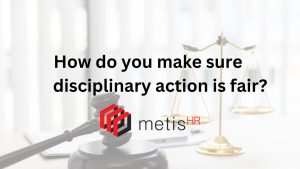Common HR Issues And How To Solve Them
There are some common HR issues that most businesses with staff will face. Many businesses trust these issues to an HR professional, either in-house or
Articles
There are some common HR issues that most businesses with staff will face. Many businesses trust these issues to an HR professional, either in-house or
When is a warning not a warning? The simple answer is when it’s not carried out correctly. We get a surprising number of calls from

The Chair of any Disciplinary Hearing finds the question, “How do you make sure disciplinary action is fair?”.Being able to demonstrate that any formal disciplinary
Categories
Copyright © 2020 Metis HR Ltd. Registered Company No: 07554123. All Rights Reserved
Website by Thomas Cole Digital